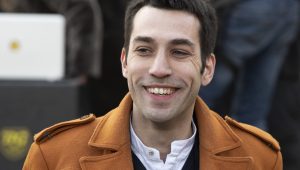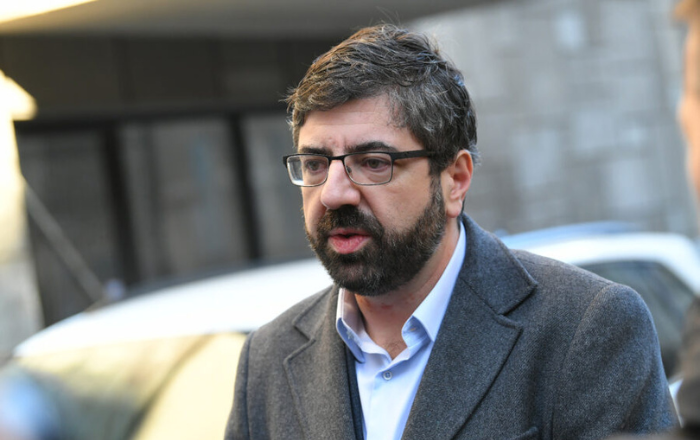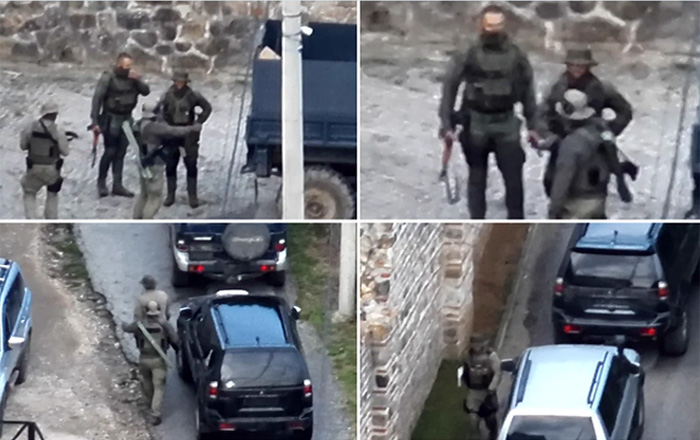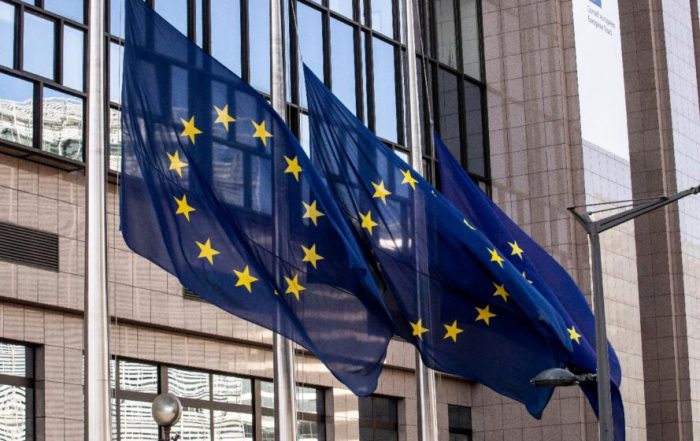
Is it a coincidence that the new mayoral candidate of the Serbian capital has a name that is a diminutive of the word good, and that the Ne davimo Beograd website logo says “For good a city”, which is the name of the entire ideological platform of this citizens’ movement? Or did political scientist and civic activist Dobrica Veselinović accidentally choose the name “good mayor” for his Twitter nickname?
Yes, says Veselinović. We want to be the better, the good side of Belgrade, the one that resides on the opposite side of the street from the one where illegal demolition and construction takes place.
- Could Belgrade’s SNS authorities, embodied in Goran Vesić, who have been shunning all initiatives from Belgrade citizens for years, even the loudest ones from the Ne davimo Beograd initiative, finally be detonated with the help of the good?
I absolutely think that the arrogance of the current city administration cannot be answered with the same “weapon”. Not because it is extremely difficult to match the level of corruption and violence they produce, but because the model of behavior, not only of this one, but of city administrations in the past decades, is deeply flawed.
It is a model of privatizing public and private goods, a model of diminishing the voice of citizens, and prioritizing the wishes and profit of investors instead of working on improving the quality of life. Yes, in our view, the model of general corruption and violence, not only of the political kind, which is dominant in Serbia, can only be overcome through solidarity, care for people and love for our city.
- You were in Zagreb, where a team similar to yours, the ‘Možemo!’ Movement, simply swept political opponents off the stage. Can something similar be repeated in Belgrade, in the city elections scheduled for the spring of 2022?
– Our cooperation with the people gathered around the platform “Možemo!” It started more than ten years ago, when we launched initiatives for defending public spaces, spaces for independent culture and studied the topics of sustainable development almost in parallel. During all these years, we have collaborated, gotten to know each other and learned from each other. I would say that these formative years have shaped us in a political sense and that we have yet to follow what this new generation of political actors in the Balkans will do. Of course, the situation in Croatia is much more favorable, in terms of electoral conditions, freedom of the media, and even the atmosphere in society, but I am optimistic, the energy that has been felt in Belgrade for months and the organic growth of ‘Ne davimo Beograd’ tells us that we are on the right track.There is no way we will stop now.
- What are the differences and similarities in the political circumstances of Serbia and Croatia, i.e. Belgrade and Zagreb?
– When it comes to similarities, I would point out that in both societies “spirits of the past” appear little by little and want to profit politically and in all other ways by inciting national hatred and introducing division among citizens.
On the other hand, Croatia, as a member of the European Union, can and does use a large number of instruments of assistance and cooperation, and this can be seen through various improvements in the quality of everyday life. In addition, a very big step forward has been made in Croatia in the field of equal and fair public information and, perhaps most importantly, in the field of maximum trust in the democratic process and the democratic implementation of the electoral process. Just as one illustration – the results of the elections in Croatia are known and publicly announced by 23:00 on the same day, while in our country the counting and appeals related to the process last for literally weeks and months.
- Your comrade-in-arms, Radomir Lazović has already hinted on several occasions that you will be the candidate of the Initiative “Ne davimo Beograd” for the Mayor of Belgrade. Is that decision final?
– I am extremely happy about that proposal and I am ready to give all my knowledge, experience, energy and love. It would be a great honor for me to be the official candidate for Mayor, but for the final decision we still have to wait for the Assembly of the movement, which, as every year, is symbolically scheduled for the Liberation Day of Belgrade in World War II – October 20.
- Which battles for Belgrade have you lost so far, and which ones have you won? What will happen to “Belgrade Waterfront” when the government changes?
– I think it is more important what we have learned, what kind of people we have become and what kind of organization and support mechanisms we have built, than which battles we have won and lost. Of course, it is important for us how many people we defended against eviction, how many harmful projects we stopped, but it is also important to us how many people we inspired and freed from the fear of clearly saying what they are against. It seems like a Sisyphean task, but that’s exactly why we’re here, because we have nowhere else to be and we don’t have the calculation and the desire to leave our city. We only have the desire to make it a better place to live and to make it a city we are proud of again, and where people want to come.
“Belgrade Waterfront” will undergo a serious revision and rehabilitation, as well as numerous legal proceedings and compensations that will be paid for by investors and the related political elite. Just an illustration: Siniša Mali and Aleksandar Vučić visit the works in “Belgrade Waterfront” once a month, which clearly shows that they are much more involved in this project than is now known.
- According to public opinion polls, at the moment, the Initiative “Ne davimo Beograd” has seven percent support among Belgrade citizens, which is not small, but not enough to win power. How do you plan to increase the number of people who would circle your name on the ballot?
– We are constantly on the ground with citizens across the city. In the past few years, we have come a long way from an informal group of friends and a protest movement to a stable organization. We have structured our movement, but also launched a membership campaign, so that we now have over 3,200 members, which is a figure that some established political parties could envy, having in mind our local character. Last year, we elected a new leadership and bodies, so the growth we see is a consequence of the great work in the field and the efforts of hundreds of volunteers.
In the future, we will continue to do everything we have done so far – and that is to be physically everywhere where the public interest is violated, but also to offer solutions and suggestions on how the quality of life in Belgrade can be increased and how Belgrade can become a good city for all.
- How would you assess the current cooperation with similar movements in Belgrade and Serbia, but also the opposition parties?
– Cooperation with movements is natural and organic. That cooperation flourishes and ennobles. We visit, cooperate, learn, develop tactical networks and become friends in addition to being comrades-in-arms.
We are cooperating with the opposition on three points: fighting for fair and honest elections, working for freedom of the media and opposing violence. I will be honest – this cooperation is not pleasant or easy, especially since we have some interlocutors from the previous governments, and therefore, those responsible for the situation in our society today, but our role is to be constructive, to contribute to the development of a different political culture, to cooperate with everyone, all for the sake of laying better institutional foundations for the future of democracy.
This does not mean that we will go to the polls together with them or make rotten compromises and coalitions, but it does mean that we will cooperate in overthrowing the regime of the Serbian Progressive Party. I think it is important to mention that we are cooperating with close green and green-left organizations from the region, with “Možemo!” from Croatia and URA from Montenegro, and we are part of international networks, such as the Progressive International, as well as the Municipal Network, in which we have so far mostly cooperated with Barcelona en Comu, the organization of the mayor of Barcelona.
- In the last presidential election, you supported the so-called boycott opposition. Will there be a boycott this time as a way to delegitimize the election process and the government?
– The boycott certainly showed the deep cracks in democracy (and it is questionable if it even exists in Serbia) and the great moral crisis into which our society has fallen. The boycott exposed not only the SNS regime, but also other opposition actors, who, after lowering the electoral threshold to three percent, took part in those illegitimate and irregular elections. As far as we are concerned, the matter is quite clear – first we have to fight for more democracy and at least moderately fair elections, and then we do everything possible to liberate Belgrade by taking part in those elections.
- The former mayor of Sabac, Nebojsa Zelenovic, who is in favor of Serbia’s faster accession to NATO and the EU, has become one of your close associates. What is the opinion of the Initiative “Ne davimo Beograd” about that?
– I see Serbia in the West, and our path to EU membership, despite the structural problems within the Union, has no alternative. As for military alliances, for the 21st century we need a different kind of army, one that fights climate change and its obvious consequences. We need a “military” response to natural disasters in the coming years. The traditionally organized army and the weapons we have will hardly help us in that fight.
With Nebojša Zelenović, we found ourselves recognizing local topics and putting local issues among the highest priorities, because change comes from below, and here at the local level, people have the most opportunities to see that change, but also to bring it about.
- What will be the backbone of the election campaign and are you preparing for the elections and how?
– For now, we have not yet decided whether we are going to take part in some future elections, that is, our declaration on the boycott is still in force. Certainly, since negotiations are underway with EU mediators to find a solution to the crisis of democracy, which we fell into after the boycott of last year’s elections, we will wait for the process to end, and then we will decide whether to go to the polls or not.
What we do all the time is offer concrete solutions to numerous problems in the city, we stand in solidarity with the citizens in hotspots throughout the city and we grow together with them. This is our city!
- Do you expect that the government and the opposition will reach an agreement on the pre-election conditions?
– At the moment we have two blocs – one negotiates directly with the government, and the other, which we are part of, does so with the EU representatives. As far as we, as the Initiative “Ne davimo Beograd”, are concerned, from the beginning we have been constructive and open to cooperation with all political actors on three issues: the fight for fair and free elections, freedom of the media and opposition to violence. I am a cautious optimist regarding the agreement with the government, but we will do everything to improve the situation in our society, and elections and electoral conditions are one of the key mechanisms for that. Not because of us and the elections, which we can hardly wait to take part in, but because of the future of democracy in our country.
- What will be your first moves after a possible change of government?
– The first move is certainly to assemble the best team, which should make a “small revolution” in the way the city is managed. The job of that team is to open all the contracts that the current city administration has made in the first few months, revise them and start solving several key problems. In my opinion, these are water and air pollution, which requires urgent and concrete action, then solving traffic jams through the improvement of public transport and much more social benefits and dealing with kindergartens, health centers, education and culture.
- For years, you have persistently and consistently adhered to the policy of ‘non-interference’ in topics of so-called high politics and stuck to urban issues. Whose support do you expect, and from which side will there be stumbling blocks?
– It was through city topics and local policies that we wanted to induce politics and awaken interest in a wider number of people to start engaging in politics. After years of depression and apathy, citizens have given up on politics, repeating the mantra “everyone is the same”. For us, that was the main goal – to show people that it can be different, that it can be more constructive, that it can be fairer, that it can be more transparent and that it can be better.
On the other hand, from the beginning, “colleagues” from the opposition considered us outsiders and frivolous “hipsters”, and dismissed the topics we raised, saying that they would never mobilize people. Of course, they were wrong about everything, and little by little they realized that we have become a respectable organization, which will only grow and show its capacity in the future. We expect the greatest support from the citizens, because together with them we can liberate Belgrade and make it a good city for everyone.
- How do you see the genocide committed in Srebrenica, the denial of which was banned by Montenegro, that is, its parliament, with numerous condemnations from Belgrade?
– The ruling criminal political elite in Belgrade, for its own interests, continues to confuse the region, instead of finally confronting the crimes committed in our name, admitting them and ending the current policy of concealment and cover ups. I think the citizens of all our countries are much closer than what politics wants to present them as, and that we should work on that. People need to be connected, people need to be talked to, new generations need to be educated, so that the history of crimes does not repeat itself cyclically, keeping us in a constant position of periphery and poverty.
Interview conducted by Goran Mišić
Photo: Srđan Ilić
Original title: Možemo dobrotom zamijeniti trovanje Beograđana prostotom
More from Ne davimo Beograd:
Lazovic to attend EP session: I expect them to call for rerun of Serbian elections
MP of the opposition Green-Left Front Radomir Lazovic said that, in its resolution on the Serbian elections, he expects the European Parliament (EP) to voice its position that elections must be repeated at all levels in Serbia, especially in Belgrade, where the opposition was robbed of its clear victory.
We Demand Responsibility and Restraint in Solving the Crisis in the North of Kosovo
We call for responsibility and restraint in solving the crisis in the north of Kosovo, in the Banjska monastery, so that the conflict does not escalate or lead to a new tragedy. We condemn provocations and violence from any side, and demand a thorough investigation.
Setting the Community of Serb Municipalities and membership in the EU as necessary first step towards the reconciliation of the two peoples
It is a real tragedy of our society that the same people who led to the fact that Kosovo is not de facto part of the constitutional order of






